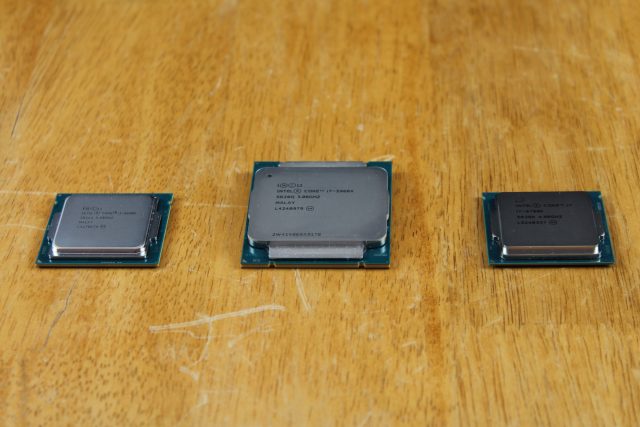
The successor to Intel's high-end Haswell-E CPU will feature up to 10 cores running 20 threads, according to a leaked set of specifications. While the specs remain unverified by Intel and firmly in the rumour camp for now, if true, the company will release four different Broadwell-E SKUs—one more than Haswell-E—starting with the 6-core i7-6800K, and ending with the 10-core i7-6950X.
The i7-6950X is the most interesting CPU of the lot, thanks to it featuring two extra CPU cores over Haswell-E. Like the i7-5960X it replaces, users will have to sacrifice clock speed to take advantage of all those threads, with the CPU running at a restrained 3GHz base clock and a likely 3.5GHz turbo clock. That makes it a less than idea choice for gamers, even with overclocking, thanks to games largely favouring single-threaded performance. The far-cheaper i7-4790K with its 4.4GHz boost clock often outperformed the i7-5960X in gaming benchmarks.
Intel appears to be making its latest high-end CPU more appealing to gamers, though, thanks to the inclusion of a 6-core chip running a 3.6GHz base clock. The higher base clock should result in a boost above 4GHz, and that's without overclocking; Ars UK pumped up its 6-core Haswell-E chip to 4.5GHz with little effort. The jury is still out on whether those extra cores will actually be worth it, though, even with DirectX 12 coming down the pike.

In our early DirectX 12 testing, we found there was no difference in performance between a 4-core CPU and a 6-core CPU, with or without hyperthreading. For the moment at least, Intel is sticking with the 4-core/8-thread setup for mainstream desktop processors like the latest i7-6700K, meaning developers are unlikely to target users with more cores any time soon.
Still, for those into high-end workstation applications, or simply just bragging rights, and want to take advantage of overclocking (which isn't supported by Intel's Xeon line) Broadwell-E looks like a worthy successor to Haswell-E. It's also expected to be compatible with the same X99 chipset and LGA 2011-3 socket of Haswell-E, which helps make the expected £800 ($1000) price of the top-end chip that little bit more bearable.
There's no word on a release date for Broadwell-E just yet, but Haswell-E launched around a year after the mainstream Haswell chips. The much-delayed desktop Broadwell chips launched in June of this year.
reader comments
54